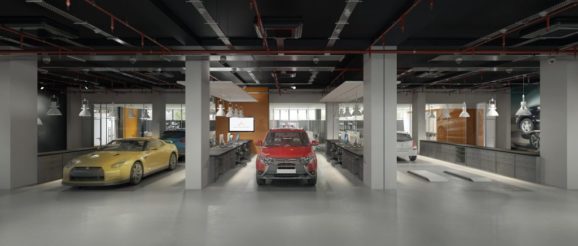Renault-Nissan-Mitsubishi Alliance Inaugurates TLV Innovation Lab, Partners With Over 10 Startups

The Renault-Nissan-Mitsubishi Alliance, a world-leading Franco-Japanese strategic partnership of auto giants, inaugurated its innovation lab in Tel Aviv on Monday, announcing close collaborations with over 10 Israeli companies and startups.
The new 1600-square-meter facility was set up at the Atidim High-Tech Park in partnership with the Israel Innovation Authority, and with CityZone, the Tel Aviv Municipality’s “living lab” where advanced technological solutions for smart city ventures are vetted and tested.
Dubbed the Alliance Innovation Lab Tel Aviv, the center will focus on sensors for autonomous driving, cybersecurity, and Big Data, and will work with the participating Israeli companies to develop Proof of Concepts as well as prototypes. The lab will allow the testing of technologies with real vehicles.
SEE ALSO: Meet The Top Israeli Startups Protecting Cars From Cyber Attacks
“With Israel as a global innovation hub, particularly with automotive technology, this new lab is a natural next step for us and will allow the Alliance to leverage the strengths of Israel’s startup ecosystem,” said Tsuyoshi Yamaguchi, Alliance EVP, Engineering. “Through collaborations with promising local startups with cutting-edge technologies, we aim to develop a variety of key technologies, which will be essential for the future of mobility.”
From left to right: Aharon Aharon, CEO of Israel Innovation Authority, Tel Aviv Mayor Ron Huldai, Tsuyoshi Yamaguchi, Alliance Executive Vice President, Engineering, Gaspar Gascon Abellan, Deputy Alliance Executive Vice President, Engineering, and Antoine Basseville, director of Alliance Tel Aviv Open Innovation Lab. Photo by Niv Kantor
The participating startups in the Alliance Innovation Lab Tel Aviv are automotive cybersecurity firms Upstream, Argus Cyber Security, Karamba Security, Enigmatos, and Saferide Technologies, automotive chip developer Autotalks, night-vision tech firm Brightway Vision, wireless EV charging tech startup firm Electreon, propulsion system developer IRP Systems, solar energy tech company Apollo Power, and Moodify, a Caesaria-based startup that developed an Empathic Car System that “feels” and responds to drivers’ needs.
“The opening of this new facility is a special milestone for us,” said Antoine Basseville, the Director of the Alliance Innovation Lab Tel Aviv. It is part of the Alliance’s growing engagement in the Israeli ecosystem, after setting-up our local innovation lab. We believe that our new facility, the Alliance partnerships with the IIA (Israel Innovation Authority), with the municipality and the University of Tel Aviv, will contribute to create a comprehensive mobility ecosystem in Atidim in a wide array of fields from smart city to our technical fields.”
The innovation lab will also work in close cooperation with Alliance Ventures, the Alliance corporate venture capital fund, to invest up to $1 billion over five years in startups, early-stage technology companies and entrepreneurial talents across the world, including in Israel. Alliance Ventures has committed to investing in Maniv Mobility, a Tel Aviv-based venture capital fund focused exclusively on automotive and mobility technologies.
The lobby of the Alliance Innovation Lab Tel Aviv. Courtesy
In addition to Tel Aviv, the Alliance operates innovation labs in Silicon Valley and Shanghai, China.
Israel Innovation Authority CEO Aharon Aharon said the new partnership will “contribute to the development of Israel’s economy, the global hi-tech sector, and all those who benefit from open collaboration around innovation.”
SEE ALSO: Mini-City Inside Tel Aviv Tests Advanced Tech For ‘Cities Of The Future’
Tel Aviv Mayor Ron Huldai also praised the initiative at the event, saying that innovation was not just about advanced technologies, but a “way of thinking.”
Tel Aviv does not only have the highest number of startups per capita in the world, but was also crowned the “World’s Smartest City” at the Smart City Expo World Congress in Barcelona in 2014, and has been making it a mission to live up to the name, not least with its CityZone project.
“High-tech cities are not necessarily ‘smart cities,’” said Huldai. “And not every technology is ‘smart’ because it is new or advanced. It is not the city that is smart, but the people are smart, and today we salute the cooperation of our city with Renault-Nissan-Mitsubishi.
Huldai, the mayor of one of the most congested cities in the world, said he hopes to see the rise of electric vehicles replace the use of private transportation which is clogging up cities.
Electric vehicles, he said, will give rise to “transport on demand” which will hopefully eliminate the need for private vehicles – and parking lots for said vehicles.
Autonomous vehicles, too, will not solve the transportation problem if people don’t make use of it for shared transport, he explained.
“Only cities and societies who work cooperatively, and who are democratic and pluralistic can push forward such initiatives,” Huldai said.
